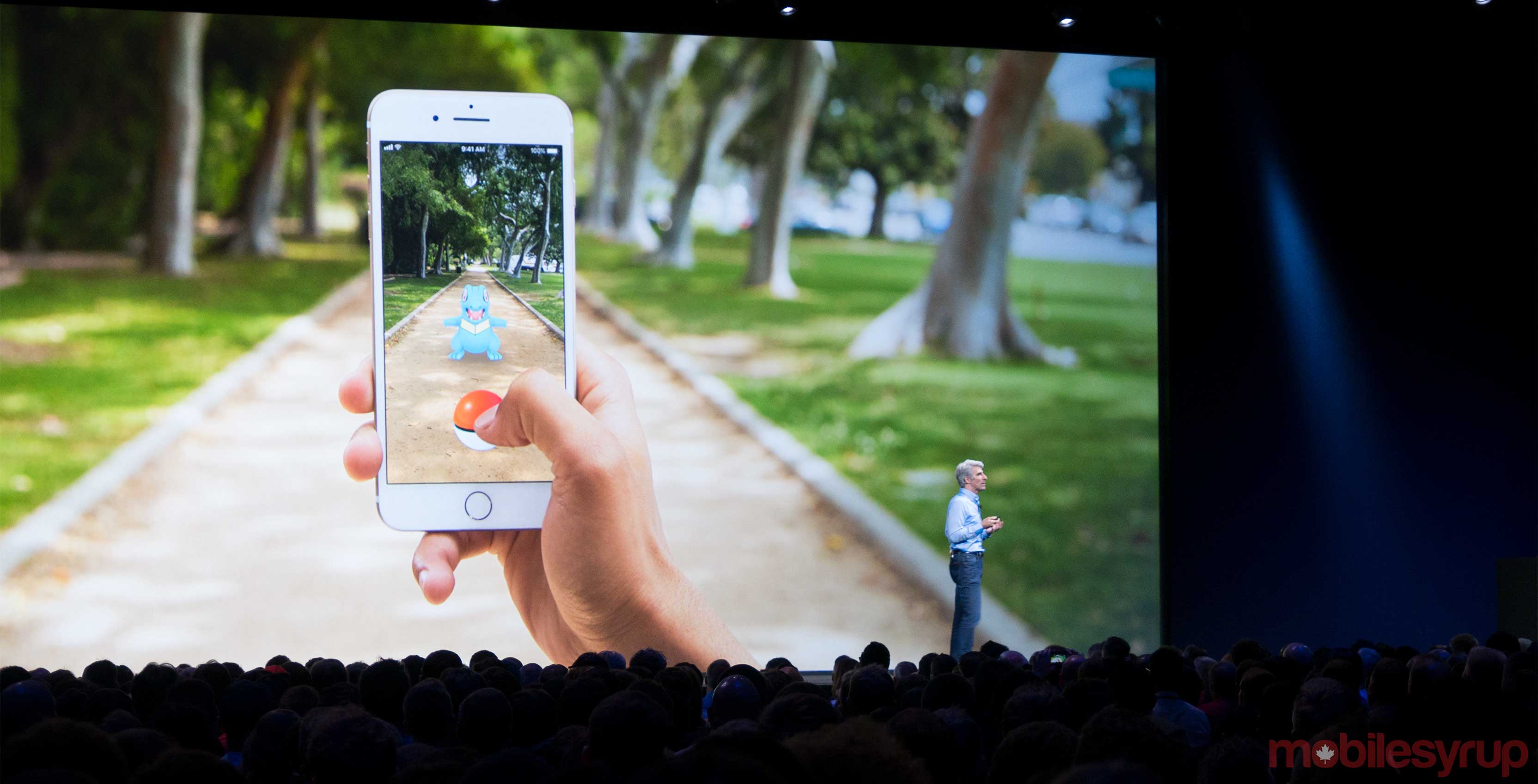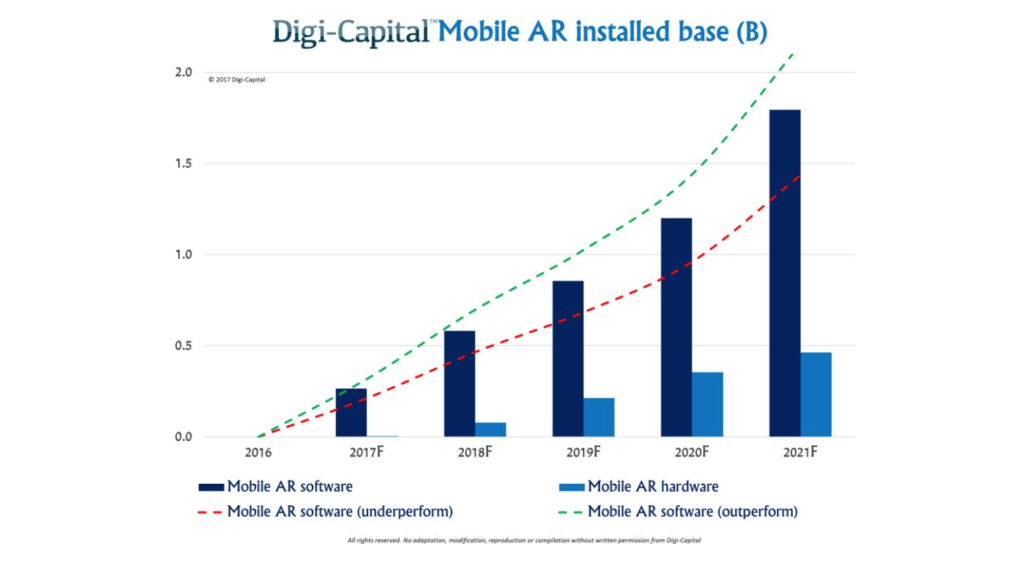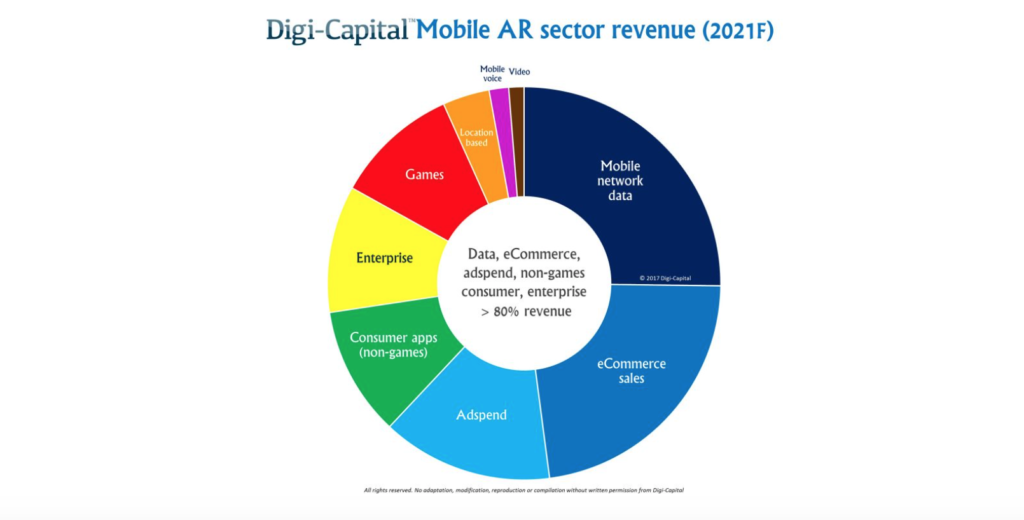
Last year’s Pokémon Go was likely many people’s first major experience with augmented reality (AR), which utilizes the burgeoning technology to place virtual pocket monsters in a real world space.
With over 750 million downloads, the Pokémon Company’s game has clearly had a massive global reach. Since then, other major companies have announced AR-focused initiatives, such as Facebook’s augmented reality platform and Apple’s ARKit.
According to Tim Merel, founder and managing director of the tech advisement firm Digi-Capital, the future of AR lies precisely in what Apple and Facebook are doing. On Monday, Merel called into a panel at VRTO at Toronto’s Ryerson University using Google Hangouts to discuss his thoughts on the future of AR technology. Specifically, his firm predicts that mobile the market will hit over one billion users and $60 billion revenue globally by 2021.
Ian Kelso talks to Tim Merel of Digi-Capital in Menlo Park about the AR/mobile platforn war, valuation & its near future. Live at #VRTO2017 pic.twitter.com/HKa2NZOlJf
— VRTO (@VRToronto) June 26, 2017
Similarly, with over 700 million iPhones out in the world, Apple also has a significant reach. Merel mentioned that AR’s integration into more and more phones will push greater hardware sales. As it stands, customers get a new phone every 2.5 years — a number that has risen, unfortunately for manufacturers. Furthermore, Merel noted that Apple encourages a high turnover rate between software updates, with 86 percent of the iPhones running iOS 10.  Given Facebook and Apple’s results at pushing new features on its platforms, Merel says he believes the companies will have similar success in driving AR going forward.
Given Facebook and Apple’s results at pushing new features on its platforms, Merel says he believes the companies will have similar success in driving AR going forward.
As well, he sees companies like Google, Tencent, Snap, Alibaba, Baidu, Samsung and Huawei following suit by delivering an estimated collective installed base of over 400 million by 2021. He compared mobile AR to virtual reality headsets like the HTC Vive, which, impressive though they may be, are also relatively inaccessible tech due to the high price point and hardware requirements. In contrast, hundreds of millions of people own smartphones that can run AR and be used on the go, instead of being tethered to a PlayStation 4 (in the case of PS VR) or PC (in the case of the Vive and Oculus Rift).
He says that the market is lucrative as well, with over 80 percent of mobile AR revenue could come from “mobile network data, eCommerce sales, advertising, consumer (non-games) apps and enterprise/business-to-business sales (B2B).”
“Mobile AR could generate huge spikes in mobile network data usage, as developers take advantage of the new features and leverage the cloud to keep things lightweight and fast,” Merel says. eCommerce sales, meanwhile, are estimated to take more than $2 USD of every $10 spent on mobile AR. This will give companies like Alibaba, Amazon and eBay (not to mention smaller startups) new opportunities to sell goods. As for non-games consumer apps, enterprise/B2B and games, they each look set to take around $1 of every $10 of mobile AR revenue, he says.
Finally, spending on ads is primed to account for more than $1 of every $10 generated by mobile AR, with Blippar being the first mobile AR advertising source. This also gives companies new ways to advertise content, with Merel specifically citing Google and Baidu as having key opportunities here, given their “wealth of data and maps platforms.”
Ultimately, though, Merel says time will tell. Apple’s ARKit is set to launch with iOS 11 later this year, meaning that’s a massive market that hasn’t yet been established. Similarly, Samsung and Huawei haven’t launched hardware yet either, so they too are up in the air at the moment.
He says that while Mark Zuckerberg has said that the first augmented reality platform is the camera, it shouldn’t be the last. To be successful, companies will need to look at phones (hardware) and applications (software) in general to drive AR content.
MobileSyrup may earn a commission from purchases made via our links, which helps fund the journalism we provide free on our website. These links do not influence our editorial content. Support us here.




